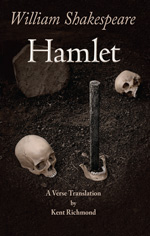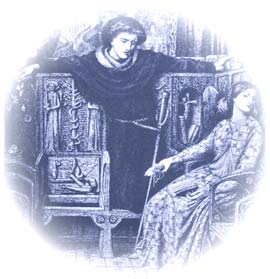
 Hamlet: A Verse Translation
Hamlet: A Verse TranslationWilliam Shakespeare
Kent Richmond (translator)
ISBN-13 9780983637929
Full Measure Press

Hamlet: A Verse Translation
William Shakespeare
Kent Richmond (translator)
ISBN-13 9780983637929
Full Measure Press

Hamlet and Ophelia
With his translation of Hamlet, Kent Richmond provides another of his sly reworkings of the language of a Shakespeare play. To keep the feel of Shakespeare, he uses blank verse, prose, rhyme, or song whenever Shakespeare does. The language is more modern without seeming anachronistic, and the size of the vocabulary matches Shakespeare’s original. You will soon forget that you are reading a translation. [read an excerpt]
Number of Unique Words
Shakespeare's original: 4,667
Richmond's translation: 4,749
To see how close the translation keeps to the structure of the original, take a look at this translation of Hamlet's famous soliloquy from Act 3. The word count is almost the same as the original, and every line is iambic pentameter. The sentences are as complex, yet the language becomes more comprehensible for today’s readers and theatergoers.
Translation of Hamlet's Soliloquy
From Act 3, Scene 1
(translation)
HAMLET
To be or not to be—that is the question:
Whether it's nobler in the mind to suffer
The slings and arrows of outrageous fortune
Or to take arms against a sea of troubles
And by resisting end them. To die...to sleep—
That's all it is—and if by sleep we end
The heartache and the thousand natural shocks
That flesh is heir to—it's a termination
Devoutly to be wished for. To die, to sleep—
To sleep, perhaps to dream. Yes, that's the snag,
For in that sleep of death, the dreams that come,
When we have slipped free from this mortal net,
Should give us pause. There's that to reckon with,
Which makes us swallow turmoil for so long.
For who would bear the whips and needles of
Our times, the tyrant's wrong, the proud man's scorn,
The pangs of love denied,1 the law's delay,
The brusque official, and rejection that
The patient and deserving take from lessers
When he himself could settle all accounts
With one thin dagger? Who would bear these loads,
To grunt and sweat beneath a weary life,
Unless the dread of something after death—
An undiscovered country, from whose frontier
No traveler returns—confounds this urge,
And makes us rather bear the ills we have
Than fly toward others we know nothing of?
Our conscience,2 thus, makes cowards of us all,
And thus the natural color of resolve
Turns sickly in the pallid shade of thinking,
And enterprises of great scope and moment,
Because of this, their currents go awry
And drift into inaction.
| Word Range Comparisons | |
|---|---|
| Word Count in original | 262 |
| Unique words in original | 156 |
| Word Count in translation | 261 |
| Unique words in translation | 155 |
Read another excerpt
Buy Paperback

Hamlet and the Players
1 The original is either despised love (meaning unrequited) or disprized love (meaning unvalued). [return to the play]
2 Shakespeare could mean general consciousness, not moral conscience. Alternate translation: “Thus, consciousness makes cowards of us all.” [return to the play]
